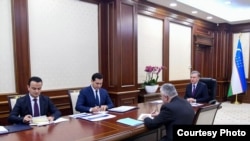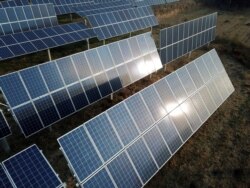It was to have been a benchmark deal, not only bringing a new energy source to Central Asia's most populous country, but also signaling that Uzbekistan, after decades of insular authoritarian rule, wanted to be a player in the global marketplace.
But two years later, the $1.3 billion contract to build a national solar energy generation system languishes with an uncertain future, providing an object lesson for other emerging economies seeking to open their markets to international investors.
This was not Uzbekistan's first bid to open up an economy that had long stagnated under the rule of dictator Islam Karimov. Since coming to power in 2016, President Shavkat Mirziyoyev has made attracting foreign direct investment one of his top priorities.
His government has opened new sectors of the economy to competitive tenders; tapped global debt markets with a $1 billion Eurobond; and signed a spate of investment contracts with companies from advanced industrial economies including France, Canada and the United States.
"Uzbekistan is not the same anymore. I personally guarantee that. We will create all necessary legal and institutional conditions" to make Uzbekistan attractive to investors, Mirziyoyev said during a recent visit to Turkey.
But the contract with SkyPower Global, a Canada-based but majority-American-owned energy company, stands out, both for its sheer size and for what has since befallen it.
The agreement was to provide solar energy generation capacity throughout Uzbekistan, marking the country's first large-scale power purchase agreement. But the deal remains stuck over the nation's failure to deliver on a promised payment guarantee.
The guarantee would ensure that SkyPower's costs would be covered even if its state-owned partner, UzbekEnergo, failed to pay as contracted for the energy it received. Without that assurance, CEO Kerry Adler told VOA in an interview, SkyPower simply cannot work in Uzbekistan.
Adler said Mirziyoyev personally persuaded him to invest in Uzbekistan during a 2017 business dinner in New York, arguing that his country needed solar power infrastructure and wanted to learn from SkyPower's experience.
"I looked President Mirziyoyev in the eyes, and said, 'I want to know, if I'm able to get approval from our board to make a sizable investment, are you going to follow through with all these reforms and commitments that you've laid out to hundreds of people in the room at this dinner?' And this is on the sidelines of the U.N. He shook my hand, he said, 'Be in Tashkent in two weeks,' " Adler said.
The Uzbek government has not issued any formal explanation for the holdup. However, reliable sources in Tashkent have identified at least two major issues to VOA.
First, the Uzbek side has had cold feet about the cost: SkyPower-produced energy will be priced at 6 cents per kilowatt hour, but more affordable offers have since come along. Second, Uzbek laws do not allow the Ministry of Finance to provide the payment guarantee that SkyPower wants.
Mirziyoyev issued a decree in April 2018 ordering the ministry to provide such a document and instructing relevant parts of the government to work with SkyPower. Still, the legal system has not been adjusted to permit it.
"The decree said this contract is valid. This is with UzbekEnergo, who's now become the national power company, and the president directed his minister of finance to forthwith, immediately issue a payment guarantee, because … Uzbekistan doesn't even have an investment grade credit rating today," Adler said.
"Trust is something you cannot buy. And if some guy at the top is saying, 'Trust me, trust me, trust me,' but all the guys underneath, they're cutting out his legs and not following his directive, then no one's going to come," Adler added.
The U.S. government has urged Tashkent to honor its contracts, and the case has become a crucial test for Mirziyoyev's government, not least because of the size and scale of the proposed project.
As other present and potential investors anxiously watch, Adler looks to Mirziyoyev himself to break the logjam.
"It's the people beneath him that are not executing — that is causing consternation, and it's got a lot of investors on the fence. Is this real, or is this not real? To the point where people are wondering: Why would they not honor a contract? Why don't they honor a president's decree? You know what the response is? No response," Adler said.
Adler said he believes Mirziyoyev is serious about economic reform. "The problem is the decision-making below the president, or the desire of decision-makers below the president to overcome fear of making the wrong decision. So fear is one of the greatest inhibitors … no one wants to be the one to make the decision, whether it's the smallest thing, like a piece of land, or whether it's issuing a sovereign guarantee."
Adler said his company is still very much committed to the deal, and is simply asking Uzbekistan to follow international business norms.
Within a few hours of VOA's interview with Adler going online, Uzbekistan's Ministry of Investments and Foreign Trade reached out to the company and there have been at least two meetings, including a videoconference between Tashkent and Toronto.
In an October 2019 interview with VOA and in speeches, Minister Sardor Umurzakov said that Uzbekistan was learning to work with Western investors, hearing their grievances, and dealing with the issues that current and potential ones fear.
Evan Feigenbaum, vice president of the Carnegie Endowment for International Peace, said Uzbekistan is not the first emerging economy to be confounded by expectations it has created.
"It's really interesting to see how governments that chase foreign investment then find themselves challenged by the high expectations of those investors for stability, predictability and the assimilation of global best practices — or at minimum, better practices," he said.
"Investment is, ultimately, a vote of confidence in an economy — companies that invest ... actually pay a great compliment to a country when they choose to put their money into people, plants and assets. So it will be interesting to see not just whether the case gets resolved but whether and how that, in turn, says something bigger about the direction of reforms there," Feigenbaum added.
Adler fondly recalls Mirziyoyev's guarantee that investors in Uzbekistan would operate in a transparent, honorable, ethical environment, where the rule of law is followed.
"OK, well, if the rule of law is followed, you have a contract, you've issued a presidential decree, honor your word," Adler said. "Because otherwise, if your word is not worth anything … why should anybody come to Uzbekistan?
"He has a chance to make it right. SkyPower is his chance to make it right. The world is watching."






